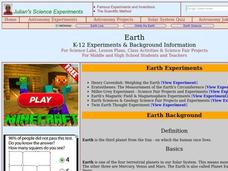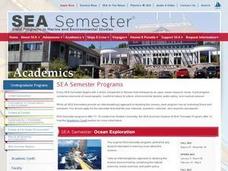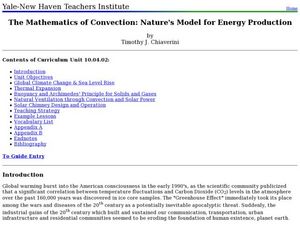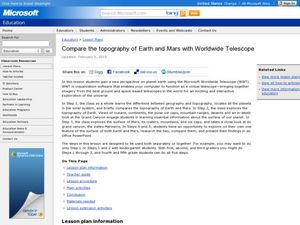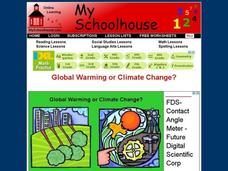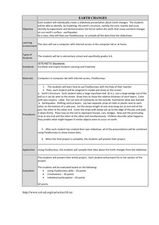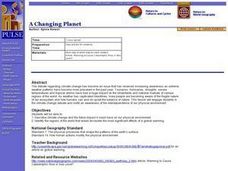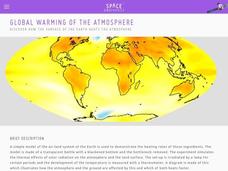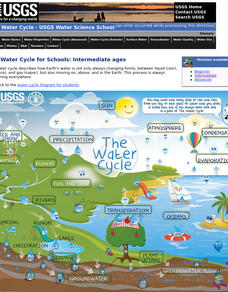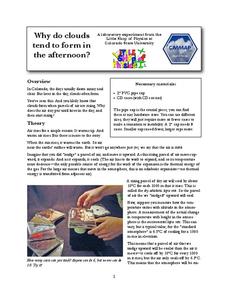National Wildlife Federation
I’ve Got the POWER! Solar Energy Potential at Your School
Should every school have solar panels? The 19th lesson in a series of 21 has scholars research the feasibility of using solar panels at their school. They begin by gathering data on the solar energy in the area before estimating the...
Science 4 Inquiry
Rocks Makin' Rocks: Rock Cycle Simulation
Scholars review prior knowledge before completing a hands-on simulation of the rock cycle. They write stories or songs summarizing their simulations to demonstrate mastery.
Curated OER
Earth
Students study the earth in relation to the solar system. In this planetary lesson students complete several investigations into the measurement of the earth and its magnetic field.
Curated OER
Waters of the Earth
Young scholars make a striking visual display showing the distribution of water on earth.
Curated OER
Changing Planet: Sea Levels Rising
Begin by showing a six-minute video, Changing Planet: Rising Sea Level as an anticipatory set. Pupils draw a topographic map of a potato continent. Finally, they will visit NOAA's sea levels online map and NASA's carbon dioxide...
Curated OER
Sculptors of the Earth
Learners observe evidence of erosion and various rock formations that have formed as a result of erosion and weathering. Their task is to explain how the forces of weathering and erosion contributed to sculpturing these rocks into arches...
Scholastic
Study Jams! Weathering & Erosion
RJ argues that playing the video game, Super Duo Breaker and Whoosh, is a good way to study for a quiz on weathering and erosion. The game character Mr. Breaker breaks things down and the character Mr. Whoosh carries them away in the...
Port Jefferson School District
Climate Patterns
Young climatologists explore the factors that contribute to a region's climate in this two-part earth science activity. To begin, learners are provided with a map of an imaginary planet and are asked to label global wind and...
Curated OER
Reflections on Earth: Exploring Planet Earth from Space
Students examine satellite images of Earth and contrast images at different scales. For this exploring Earth from space lesson plan, students use satellite images to contrast images at different scales, calculate distances from the scale...
Curated OER
Exploring the Ares 1-X Launch-Energy Changes
In this energy changes activity, students solve 5 problems using the formulas for potential and kinetic energy related to baseball energy, coasting rocket energy and the energy of falling stones.
Curated OER
The Mathematics of Convection: Nature's Model for Energy Production
High schoolers conduct a series of experiments to investigate density, buoyancy and climate. In this math lesson, pupils design and build a hot air balloon to demonstrate convection. They research and write a paper about solar chimneys.
Curated OER
Solar Isolation Changes and the Sunspot Cycle
In this sunspot cycle and solar irradiation worksheet, learners use 2 graphs of daily total solar irradiance and sunspot activity to solve 3 problems. They find the average solar irradiance during a given time, they determine the...
Curated OER
Compare Topography of Earth and Mars with a Worldwide Telescope
Learners compare geography to topography. In this topography lesson, students examine the topography of the surfaces of the Earth. Learners compare one feature of Earth to one feature of Mars and present in a PowerPoint.
My Schoolhouse
Global Warming or Climate Change?
In this online interactive global warming and climate change worksheet, students respond to 10 multiple choice questions regarding the information included in the provided paragraphs.
Curated OER
Global Warming or Climate Change?
In this online interactive global warming and climate change worksheet, students respond to 10 multiple choice questions regarding the information included in the provided paragraphs.
Curated OER
Earth Changes
Learners investigate the earth's structural layers by participating in hands-on activities. They identify the earth's structure and investigate earthquakes.
Curated OER
PLATE MOVEMENTS AND CLIMATE CHANGE
Students label three geological maps with continents provided to analyze the relationships between the movement of tectonic plates and the changes in the climate. In small groups, they discuss their findings and form hypotheses about the...
Curated OER
A Changing Planet
Students describe climate change and the future impact it could have on our physical environment. They identify the regions of the world that would encounter the most significant effects of a global warming.
Space Awareness
Global Warming of the Atmosphere
Scientists know the amount of carbon dioxide in the atmosphere today is higher than at any point in the last 800,000 years. Scholars learn about the amount of thermic radiation absorbed by air and what happens to the rest of the...
S2tem Centers SC
Seasons
Winter, spring, summer, and fall—take the learning of the seasons beyond the elementary level to the middle school classroom. Curious learners begin by watching videos about the seasons and the rotation of planet Earth. Then,...
Chicago Botanic Garden
Understanding the Greenhouse Effect
Dive into the power of the sun with a two-part lesson. Budding scientists model the greenhouse effect in a hands-on activity, and then participate in a skit that explores the earth's energy balances and what really occurs in the...
US Geological Survey
The Water Cycle for Schools: Intermediate Ages
Water can travel from the highest mountain tops to the largest oceans. Using an interactive, young scientists trace the movement using an interactive online resource. They follow the water cycle by reading pop-up explanations on a...
Colorado State University
Why Do Clouds Form in the Afternoon?
The stability of the atmosphere changes on a daily basis. A kinesthetic lesson models how the stability of the air changes as it's warmed by the sun. Learners connect their models to the changing air currents and movement of warm and...
Nevada Outdoor School
Let It Snow! Let It Melt!
Winter weather offers a great opportunity to teach young scientists about the states of matter. This activity-based lesson includes a range of learning experiences, from experimenting with the rate at which ice melts...




